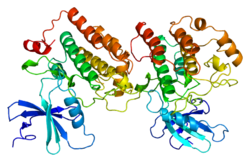CSNK1E
Casein kinase I isoform epsilon is an enzyme that in humans is encoded by the CSNK1E gene.[5][6]
Function
[edit]The protein encoded by this gene is a serine/threonine protein kinase and a member of the casein kinase I protein family, whose members have been implicated in the control of cytoplasmic and nuclear processes, including DNA replication and repair. The encoded protein is found in the cytoplasm as a monomer and can phosphorylate a variety of proteins, including itself. This protein has been shown to phosphorylate proteins of the Period family of circadian rhythm proteins. A homolog of this mammalian protein can be found in Drosophila melanogaster. Known as doubletime, this protein also plays a role in the phosphorylation of proteins involved in circadian rhythms. Two transcript variants encoding the same protein have been found for this gene.[7]
Interactions
[edit]CSNK1E has been shown to interact with PER1[8] and AXIN1.[9]
Inhibitors
[edit]- Selective
- Non-selective
- PF-670462 (also inhibits CK1-δ)
See also
[edit]References
[edit]- ^ a b c GRCh38: Ensembl release 89: ENSG00000213923 – Ensembl, May 2017
- ^ a b c GRCm38: Ensembl release 89: ENSMUSG00000022433 – Ensembl, May 2017
- ^ "Human PubMed Reference:". National Center for Biotechnology Information, U.S. National Library of Medicine.
- ^ "Mouse PubMed Reference:". National Center for Biotechnology Information, U.S. National Library of Medicine.
- ^ Fish KJ, Cegielska A, Getman ME, Landes GM, Virshup DM (Jun 1995). "Isolation and characterization of human casein kinase I epsilon (CKI), a novel member of the CKI gene family". The Journal of Biological Chemistry. 270 (25): 14875–83. doi:10.1074/jbc.270.25.14875. PMID 7797465.
- ^ Sakanaka C, Leong P, Xu L, Harrison SD, Williams LT (Oct 1999). "Casein kinase iepsilon in the wnt pathway: regulation of beta-catenin function". Proceedings of the National Academy of Sciences of the United States of America. 96 (22): 12548–52. doi:10.1073/pnas.96.22.12548. PMC 22983. PMID 10535959.
- ^ "Entrez Gene: CSNK1E casein kinase 1, epsilon".
- ^ Vielhaber E, Eide E, Rivers A, Gao ZH, Virshup DM (Jul 2000). "Nuclear entry of the circadian regulator mPER1 is controlled by mammalian casein kinase I epsilon". Molecular and Cellular Biology. 20 (13): 4888–99. doi:10.1128/MCB.20.13.4888-4899.2000. PMC 85940. PMID 10848614.
- ^ Zhang Y, Qiu WJ, Chan SC, Han J, He X, Lin SC (May 2002). "Casein kinase I and casein kinase II differentially regulate axin function in Wnt and JNK pathways". The Journal of Biological Chemistry. 277 (20): 17706–12. doi:10.1074/jbc.M111982200. PMID 11884395.
External links
[edit]- Human CSNK1E genome location and CSNK1E gene details page in the UCSC Genome Browser.
- PDBe-KB provides an overview of all the structure information available in the PDB for Human Casein kinase I isoform epsilon (CSNK1E)






